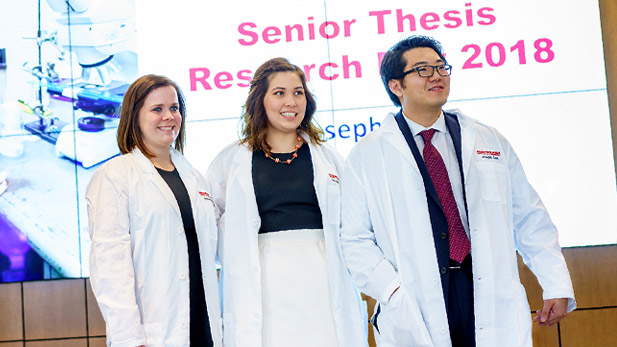Biology Seniors Put Science Under Microscope

Research projects give senior biology students a variety of valuable educational experiences each academic year, preparing them for graduate school, medical school or scientific careers.
Scientific discoveries are being made around every corner of the Rose-Hulman campus, as demonstrated by biology students completing a variety of research projects for their senior-year thesis.
Joseph Lee grew jimsonweed inside the William Alfred Cook Laboratory for Bioscience Research and then studied how tobacco hornworms were affected after eating the plants.
In Olin Hall’s Biology & Biomedical Research Laboratory, Madeleine Pasco used high-powered microscope to examine single-cell, microscopic organisms with tiny iron crystals inside them known as magnetotactic bacteria.
Jessica Will investigated the resistant effects in samples of staphylococcus species collected from surfaces throughout campus academic and sports/recreation buildings on campus.
The results of these seniors’ efforts were featured in this year’s Biology Thesis Research Day during the winter academic quarter.
These laboratory discoveries are an important part of the educational process for Rose-Hulman biology students, according to John M. Beals, distinguished research fellow of biotechnology discovery research at Eli Lilly and Company. He is a member of the Department of Biology and Biomedical Engineering’s professional advisory board.
“Rose-Hulman students are learning to work on problems where the answers aren’t in a book or within a lecture. They are being found with their own eyes through the microscope, and through trial and error that fills the research process,” says Beals. “These are real experiences that are implacable to real-life situations, and an invaluable learning tool for graduate school and beyond.”
The projects presented this year were incubated as a concept nearly a year earlier, and flourished into an idea through consultation with faculty mentors, according to Peter Coppinger, associate professor of biology. These professors supervise the intensive research conducted during the next two academic terms or throughout the summer. A comprehensive research thesis is completed during the winter quarter of the student’s senior year, with a 20-minute presentation made at each year’s Biology Thesis Day.
“We provide our students with an extensive hands-on research experience that prepares them for the rigors of graduate school, medical school or work in industry,” says Coppinger, pointing out that several thesis projects have been featured in scientific journals and at regional or national conferences.

